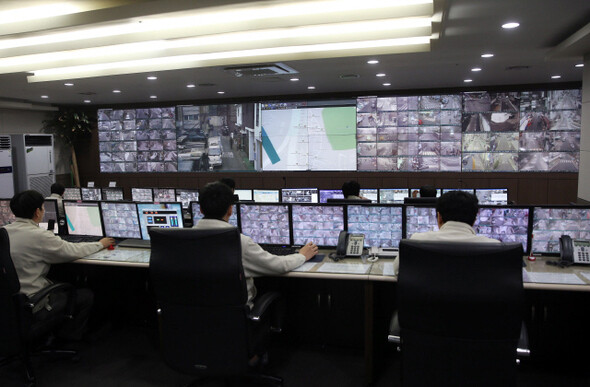hankyoreh
Links to other country sites 다른 나라 사이트 링크
Study: police illegally monitoring civilians

By Song Ho-kyun, staff reporter
Police stationed at integrated CCTV control centers in 84 cities, counties, and districts around the country have been illegally observing and monitoring footage of citizens, study data reveal.
They were also found for the first time to have illegally manipulated CCTV cameras to zoom in on and record the faces of demonstrators.
According to a national survey of local government integrated control centers acquired by the Hankyoreh on Mar. 23 through the office of Democratic Party lawmaker Chang Ha-na and the progressive network center Jinbonet, police were found to be stationed at 84 of the 101 integrated control centers set up in South Korea‘s cities, counties, and districts since 2010 for crime prevention, parking control, and school violence prevention.
The local governments in question commissioned private businesses to control the cameras. The data now show that police are going to the centers and effectively directing the businesses.
While it is legal to hire a private business to control CCTV cameras, no legal basis exists for police to be stationed or issue directions there.
The local governments have permitted the stationing by signing “work agreements” with local police stations. The agreement between the city of Ansan, Gyeonggi Province, and its security agency clearly stipulates, “authorities for CCTV operation lies with the police station chief.” The one for the Mapo district in Seoul states, “one or more police officers from the local office must be dispatched to work [at the center] for CCTV image information management and swift response to incidents or accidents.” In the case of Busan’s Gangseo district, the agreement says, “the police chief must dispatch oversight police officers on a 24-hour basis for management and oversight of CCTV monitoring.”
The problem is that these actions and agreements violate the law. Article 18 of the Personal Information Protection Act strictly restricts public institutions from providing personal information - such as video information collected on CCTV - to a third party. The only instances when it is allowed are when required for a criminal investigation or the lodging and continuation of an indictment, for court trial duties, or for enforcement of a pact with a foreign government or international organization. The terms allow police use of a public institution’s CCTV data only under exceptional circumstances, such as a criminal investigation.
It was also learned that the centers where the police were stationed illegally manipulated the camera to capture images of demonstrators’ faces. A “crime prevention” camera in front of Daehan Gate in central Seoul did 10 pans and 16 zoom-ins on participants in a demonstration for dismissed Ssangyong Motor workers between 5 and 6 pm on Aug. 21 of last year. Police are stationed at the Central District Office Integrated Control Center, which operates the cameras.
The image collection violates Article 25 of the Personal Information Protect Act, which states that operators, “shall not handle arbitrarily visual data processing devices for other purposes than the initial one, nor direct the said devices toward different spots, nor use sound recording functions.”
But 23 of the 84 centers did have operational guidelines permitting such pans and zooms, while 40 of them specified “uses beyond the [official] purposes.”
“The police are illegally running a system of everyday citizen surveillance,” said Chang Ha-na. “This raises serious concerns about violations of privacy and human rights, and the police need to withdraw immediately from the control centers.”
A senior police officer, speaking on condition of anonymity, said the stationing was not illegal.
“The police are a public institution, so they’re not the kind of ’third party‘ the law refers to,” he insisted.
Please direct questions or comments to [english@hani.co.kr]

Editorial・opinion
![[Editorial] Does Yoon think the Korean public is wrong? [Editorial] Does Yoon think the Korean public is wrong?](https://flexible.img.hani.co.kr/flexible/normal/500/300/imgdb/original/2024/0417/8517133419684774.jpg) [Editorial] Does Yoon think the Korean public is wrong?
[Editorial] Does Yoon think the Korean public is wrong?![[Editorial] As it bolsters its alliance with US, Japan must be accountable for past [Editorial] As it bolsters its alliance with US, Japan must be accountable for past](https://flexible.img.hani.co.kr/flexible/normal/500/300/imgdb/original/2024/0417/6817133413968321.jpg) [Editorial] As it bolsters its alliance with US, Japan must be accountable for past
[Editorial] As it bolsters its alliance with US, Japan must be accountable for past- [Guest essay] Amending the Constitution is Yoon’s key to leaving office in public’s good graces
- [Editorial] 10 years on, lessons of Sewol tragedy must never be forgotten
- [Column] A death blow to Korea’s prosecutor politics
- [Correspondent’s column] The US and the end of Japanese pacifism
- [Guest essay] How Korea turned its trainee doctors into monsters
- [Guest essay] As someone who helped forge Seoul-Moscow ties, their status today troubles me
- [Editorial] Koreans sent a loud and clear message to Yoon
- [Column] In Korea’s midterm elections, it’s time for accountability
Most viewed articles
- 1[Column] The clock is ticking for Korea’s first lady
- 2[Editorial] When the choice is kids or career, Korea will never overcome birth rate woes
- 3S. Korea, Japan reaffirm commitment to strengthening trilateral ties with US
- 4Korea, Japan jointly vow response to FX volatility as currencies tumble
- 5[Guest essay] How Korea turned its trainee doctors into monsters
- 6Japan officially says compensation of Korean forced laborers isn’t its responsibility
- 7US exploring options for monitoring N. Korean sanctions beyond UN, says envoy
- 8Gangnam murderer says he killed “because women have always ignored me”
- 9[Editorial] As it bolsters its alliance with US, Japan must be accountable for past
- 10‘Right direction’: After judgment day from voters, Yoon shrugs off calls for change